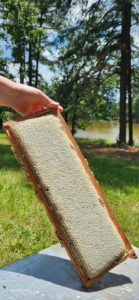
What Should I Be Doing in My Apiary This Month? June
Summer is here! Days are hot and long, the nectar flow is slowing down and just about done in …


El inglés es el idioma de control de esta página. En la medida en que haya algún conflicto entre la traducción al inglés y la traducción, el inglés prevalece.
Al hacer clic en el enlace de traducción se activa un servicio de traducción gratuito para convertir la página al español. Al igual que con cualquier traducción por Internet, la conversión no es sensible al contexto y puede que no traduzca el texto en su significado original. NC State Extension no garantiza la exactitud del texto traducido. Por favor, tenga en cuenta que algunas aplicaciones y/o servicios pueden no funcionar como se espera cuando se traducen.
Inglês é o idioma de controle desta página. Na medida que haja algum conflito entre o texto original em Inglês e a tradução, o Inglês prevalece.
Ao clicar no link de tradução, um serviço gratuito de tradução será ativado para converter a página para o Português. Como em qualquer tradução pela internet, a conversão não é sensivel ao contexto e pode não ocorrer a tradução para o significado orginal. O serviço de Extensão da Carolina do Norte (NC State Extension) não garante a exatidão do texto traduzido. Por favor, observe que algumas funções ou serviços podem não funcionar como esperado após a tradução.
English is the controlling language of this page. To the extent there is any conflict between the English text and the translation, English controls.
Clicking on the translation link activates a free translation service to convert the page to Spanish. As with any Internet translation, the conversion is not context-sensitive and may not translate the text to its original meaning. NC State Extension does not guarantee the accuracy of the translated text. Please note that some applications and/or services may not function as expected when translated.
Collapse ▲
Summer is here! Days are hot and long, the nectar flow is slowing down and just about done in …
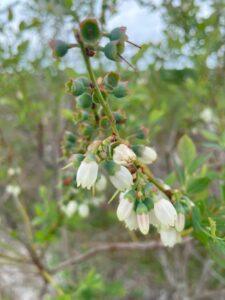
This is a guest post by Emma Payne. Emma is an NCSU zoology major and research assistant in the …
We’re happy to announce that we have received funding from USDA-NIFA to help beekeepers in Western North and South …

We are excited to announce a new opportunity for those interested in pursuing beekeeping as a hobby, or new …
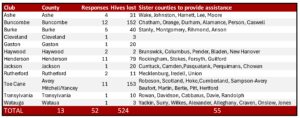
Update 11/02/24 We are tabulating a running compilation of the documented needs of beekeepers in Helene-affected areas. This table will …

With the track of tropical storm Debby poised to make a significant impact on North Carolina, there are some …
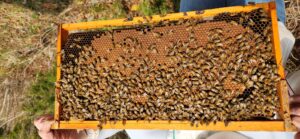
Every year, we celebrate and acknowledge our reliance on pollinators for our food supply, as a third of everything …
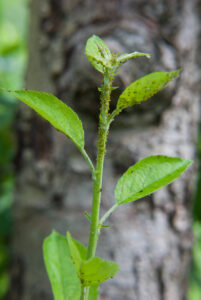
Codling Moth: Second generation codling moth is beginning to emerge in Cleveland County and similar elevations (about 800 to …
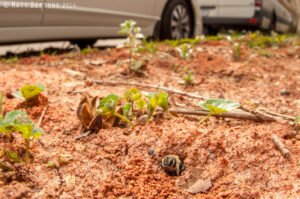
As the weather warms up, insects and other animals are becoming more active. I wrote the other day about …
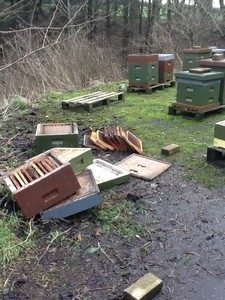
How beekeepers can minimize the effects on their hives The devil is in the details, most of which are under …
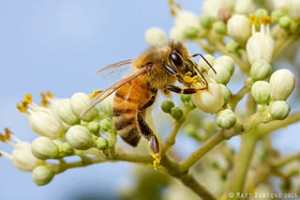
Barely a day goes by when Zika virus is not in the news headlines. As of August 31st 2016, …

This publication discusses Anthracnose Fruit Rot (Colletotrichum sp.) of blueberries in detail. Included are the …

This factsheet describes the symptoms of a shoot inhibitor herbicide injury.

This factsheet describes the symptoms of a metribuzin herbicide injury.

This factsheet describes the symptoms of a dichlobenil herbicide injury.
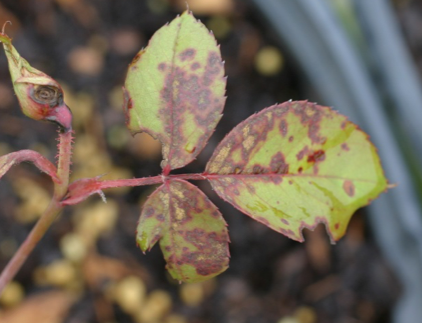
This factsheet describes the symptoms of a protoporphyrinogen oxidase inhibitor herbicide injury.

This publication discusses flying unmanned aerial vehicles (drones, model aircraft) for commercial purposes. You'll learn …
The per-capita consumption of processed tomatoes has increased steadily in recent years. This has been …
The tomato is a warm season crop. With special production practices you can produce your …